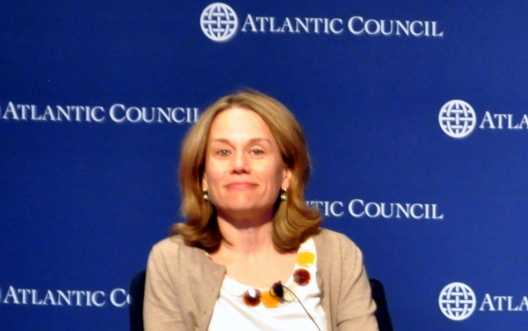 Excerpts from interview of Julianne Smith by Michael Williams.
Excerpts from interview of Julianne Smith by Michael Williams.
Williams: To what extent is it fair to classify Europe’s lack of investment in defense technology and national defense budgets as a threat to the capabilities of the Atlantic alliance?
Smith: NATO is only as strong as its individual member states, which means that when members make insufficient investments in their forces, the entire alliance suffers. During the Cold War, the United States complained about its allies’ declining defense budgets but NATO was able to maintain a relatively high level of interoperability and readiness due to the scale and types of budget cuts. In the last two decades, though, the situation has become much worse. Countries that once cut defense budgets by a single digit, say four or five percent, suddenly started to cut their defense budgets by double digits. When a member state cuts its defense budget by 20 percent or more, it is often forced to eliminate full capability sets, creating capability gaps that have real consequences for the Alliance as a whole. As the Alliance has undertaken new missions in places like Afghanistan and Libya, the impact of years of “vertical” defense cuts in a number of capitals across Europe (including some of the larger allies) has become blatantly apparent. In an effort to stop the bleeding and ensure that the Alliance could maintain the full spectrum of defense capabilities it would need to face future challenges in NATO’s East and South. NATO used its Wales Summit to secure commitments from its members to halt additional cuts and, to the extent possible, work toward the goal of meeting the longstanding NATO defense spending standard of two percent of GDP. At present, roughly two-thirds of NATO members have delivered on this pledge, but implementation of those pledges is by no means guaranteed….
Williams: NATO’s Libya campaign demonstrated gaps in European capability. Are those gaps wider today?
Smith: The gaps that were exposed during the Libya campaign were a result of years of declining defense budgets and a lack of investment in high-end capabilities, training and personnel. Since that mission, the Alliance has worked to identify the capability gaps and sought opportunities to fill them. That said, because European defense budgets have continued to decline even after the Libya mission, many of those gaps have continued to widen. Thanks to the pledges at NATO’s Wales Summit, however, the hope is that most members of the Alliance will reverse years of declining budgets and gradually make new investments that will increase members’ – and therefore NATO’s – ability to project power and sustain medium- to long-term operations.
Williams: Does Article 5 offer enough assurances of defense to NATO’s allies in the Baltics?
Smith: Over the course of the last year, the Alliance has undertaken a number of measures designed to reassure allies in Central and Eastern Europe. Those measures include new training and exercises, the creation of a Very High Readiness Joint Task Force (VJTF) inside the NATO Response Force, an expansion of NATO air policing over the Baltic States, and a U.S. decision to preposition military assets in Central and Eastern Europe. While the countries of Central and Eastern Europe appreciate those initiatives, many NATO members in the region continue to worry whether the Alliance would come to their aid in the face of an Article 5 attack. Such concerns are particularly acute in regards to hybrid warfare. For example, how would NATO respond if a Baltic State experienced a devastating cyber attack that was attributed to Moscow? Would allies believe that such an attack justified an Article 5 response? Polling data from publics on both sides of the Atlantic show a range of views, including uncertainty about the need to respond. Of course, one hopes that the elites of those countries would not exhibit the same level of hesitation, although informal conversations I have had with European policymakers on this subject do give me pause.
Dr. Michael Williams, Professor of International Relations at New York University, recently spoke with Julianne Smith about the changing climate in transatlantic security. Smith is a Senior Vice President at Beacon Global Strategies LLC and former Deputy National Security Advisor to the U.S. Vice President Joseph Biden. Prior to her time at the White House, Smith served as the Principal Director for European and NATO Policy in the Office of the Secretary of Defense at the Pentagon.
Image: Julianne Smith, former Deputy National Security Advisor to Vice President Joseph Biden, July 1, 2013
